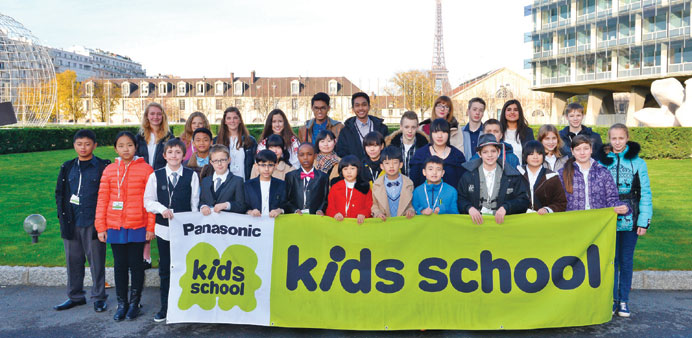By World Heritage Centre Paris,
Communication, Education and
Partnerships Unit
In order to contribute to the realisation of a sustainable society, Panasonic is engaged in various educational programmes globally such as the Unesco World Heritage Eco Learning Programme, Eco Learning Programme, and Eco Picture Diary.
The partnership developed between Panasonic and Unesco’s World Heritage Centre began in 1995 and was further reinforced in 2011 by a new wide-reaching agreement. The partnership is based on a two-pronged approach: first, promoting World Heritage and sustainable development through a global communication campaign; and secondly, supporting and participating in a number of key educational activities of the World Heritage Centre, such as the Young People’s World Heritage Education Programme, which seeks to encourage and enable future decision-makers to participate in heritage conservation and effectively respond to the threats facing our heritage.
Panasonic has also organised a number of media training workshops to teach recording and editing techniques to young volunteers engaged in World Heritage preservation. In the field of “education for the next generation” Panasonic has hosted the World Heritage Eco Learning Programme at eleven different World Heritage sites in ten countries to promote the importance of World Heritage to children.
Through the programme sponsored by Panasonic, young people visited the World Heritage sites, experiencing their beauty and importance, learnt about conservation and participated in photo shooting sessions using the Panasonic HD 3D camera.
The Eco Learning educational programme was developed by Panasonic in 2010 for primary school children between the ages of 7 and 11. The programme gives pupils the opportunity to learn about climate change and protecting our planet in an easy-to-understand and playful way. The project aims to educate and provide youths around the world with opportunities to learn and increase their environmental awareness through a number of activities. The Eco Learning Programme is particularly effective because it uses simple, creative and fun approaches to learning about climate change and protecting our planet.
Within the framework of the partnership with Unesco signed in 2011, and renewed in 2013, Panasonic is also implementing the Eco Picture Diary project in World Heritage sites in cooperation with the World Heritage Centre. School classes are gathered at the premises of a site where heritage and ecological behaviour are discussed.
The ‘Eco Picture Diary Contest’ is a global contest in which children from all over the world send their own unique ideas about how to preserve the environment and earth’s natural resources. One of the activities of the programme is to fill an “eco picture diary” where children write down and draw the activities they have done during the day and how they propose to contribute to protect their environment.
With this diary, the children take part in a contest where the best illustrations are rewarded on the occasion of a ceremony. The first one was held in Paris in February 2012 and the second one in Kyoto in November 2012. For the 2013 edition, 300.000 children have participated from 47 countries and regions. During the ceremony, 28 students from 11 countries were rewarded for different categories of prizes from ‘Best creativity’ to ‘Kid Environmental Professor’ to ‘Save our Earth’ award.
In the next two years, the ‘World Heritage Eco Learning Programme’ will be hosted at World Heritage sites in more than ten countries, including Cambodia, Spain, and Brazil, while other programmes, such as the ‘Eco Picture Diary Contest’, will be further developed.
Through this longstanding partnership, Panasonic and Unesco seek to develop innovative educational approaches and enhance the youth’s involvement in heritage conservation.
School children taking part in the Eco Learning educational programme developed by Panasonic in 2010.

